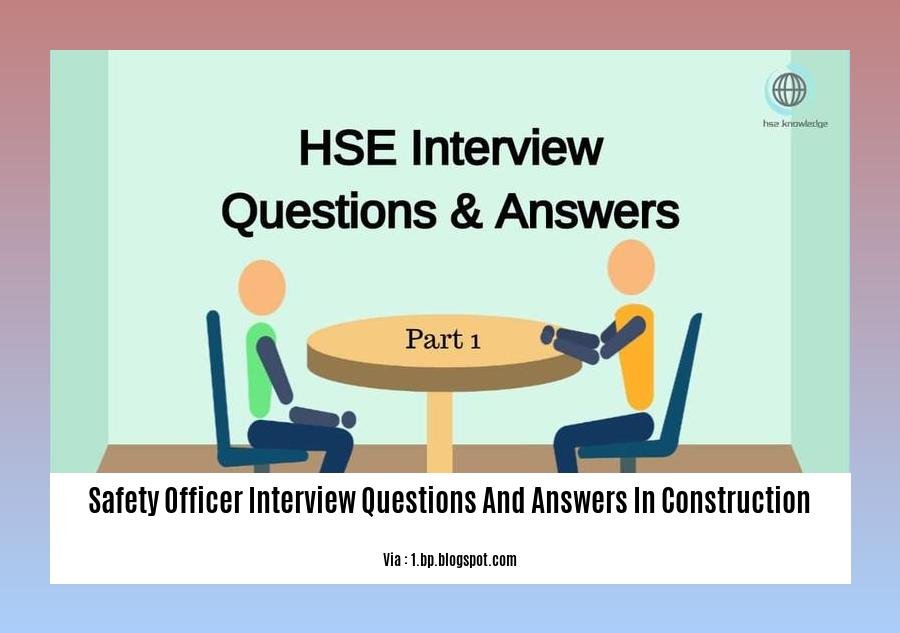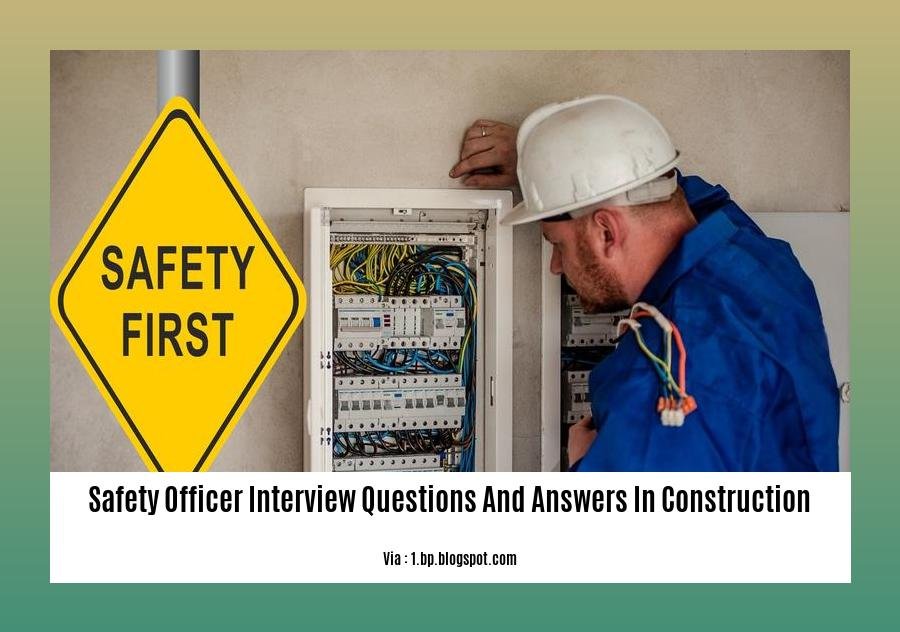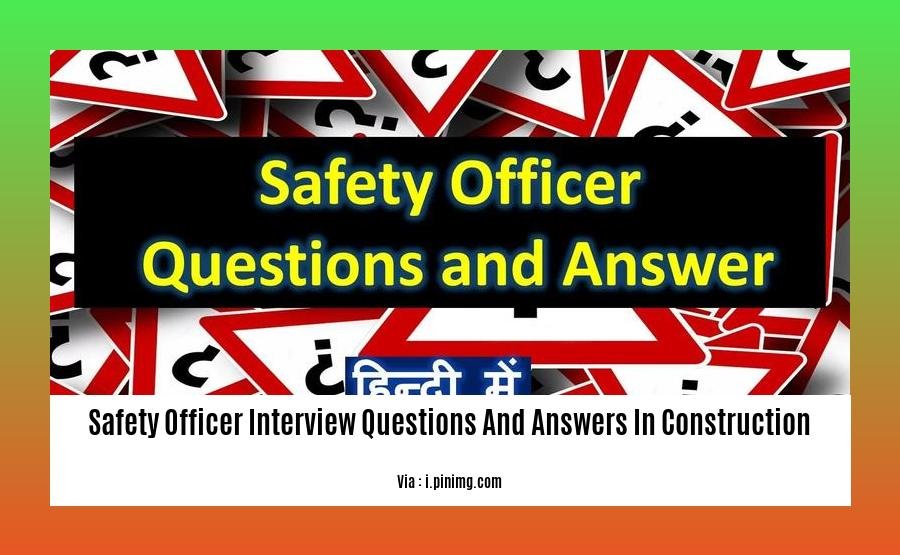Prepare for your Safety Officer interview in construction with our comprehensive guide to frequently asked questions and insightful answers. This article will equip you with the knowledge and confidence to navigate the interview process successfully and showcase your expertise in workplace safety.
Key Takeaways:
- OSHA Regulations and Safety Standards: Thorough understanding of OSHA regulations and industry best practices is essential.
- Core Safety Procedures: Implementation and enforcement of proper PPE, hazard identification, and equipment safety procedures.
- Uncooperative Worker Management: Effective communication, education, and corrective actions to ensure compliance.
- Accident Investigation: Thorough and timely investigation to determine root causes and prevent future incidents.
- Detail-Oriented and Safety Focus: Attention to detail and unwavering commitment to worker safety are crucial.
- Work Duties: Conducting inspections, enforcing regulations, providing training, and managing safety documentation.
- Safety Documentation Experience: Proficiency in handling accident reports, risk assessments, and safety plans.
Safety Officer Interview Questions and Answers in Construction

When seeking a qualified safety officer for your construction site, you’ll want to evaluate their knowledge of safety regulations, experience managing safety protocols, and ability to effectively communicate and enforce safety measures. Here are some safety officer interview questions and answers in construction to help you assess candidates.
Knowledge of OSHA and Other Safety Regulations
- Q: How familiar are you with OSHA regulations and other relevant safety standards in construction?
- A: I am thoroughly knowledgeable about OSHA regulations, including the latest updates and industry best practices. I also stay abreast of industry-specific safety standards and codes.
Enforcing and Managing Safety Procedures
- Q: How do you ensure adherence to safety procedures on a construction site?
- A: I effectively enforce safety protocols through regular inspections, hazard assessments, and employee training. I communicate the importance of safety clearly and provide guidance on proper PPE usage, hazard identification, and equipment safety.
Handling Uncooperative Workers
- Q: How do you deal with situations where workers refuse to follow safety procedures?
- A: I approach such situations with empathy and understanding. I communicate the risks associated with non-compliance and educate the worker on the importance of following safety protocols. If necessary, I use corrective action to address recurring violations.
Investigating and Analyzing Accidents
- Q: How do you investigate construction accidents?
- A: I promptly investigate accidents to identify root causes and prevent future incidents. I gather evidence, interview witnesses, and analyze data to determine contributing factors and develop recommendations for corrective action.
Experience and Qualifications
- Q: Describe your experience and qualifications as a construction safety officer.
- A: I have over a decade of experience in construction safety, holding certifications in various safety areas. I have a deep understanding of safety principles and practices and a proven track record of implementing comprehensive safety programs that have effectively reduced accidents and injuries.
Other Relevant Questions
- What are the most important qualities of a construction safety officer?
- What are your core work duties as a safety officer?
- How do you ensure proper documentation of safety protocols and accident reports?
By asking these safety officer interview questions and answers in construction, you can assess candidates’ knowledge, experience, and approach to safety management. This will help you identify the most qualified individual to protect your workers, minimize risks, and ensure a safe and productive construction site.
If you’re seeking a safety officer in a construction company, you must know their responsibilities. Their role is to ensure the well-being of everyone on the construction site. To ensure maximum safety on the construction site, the safety officer’s responsibilities and rolesare defined clearly. For further safety precautions, learn the benefits of having a safety park in a construction site.
Common Interview Questions for Safety Officers

Key Takeaways:
- Possess a deep understanding of OSHA regulations and industry best practices.
- Demonstrate expertise in developing and implementing comprehensive safety programs.
- Showcase effective communication skills for conveying safety concepts to diverse audiences.
- Emphasize a proactive approach to accident prevention and reporting safety issues.
- Highlight experience in investigating and analyzing accidents to identify root causes.
Tell us about your experience in developing and implementing safety protocols on construction sites.
Discuss your role in establishing and enforcing safety standards, conducting inspections, and providing training to workers.
Describe your approach to enforcing safety regulations and ensuring worker awareness.
Explain how you ensure compliance with OSHA regulations and promote a culture of safety consciousness among crew members.
How do you handle uncooperative workers who disregard safety procedures?
Outline your strategies for addressing non-compliance, including educational approaches and corrective actions.
Give us an example of an accident you investigated and describe the corrective actions you implemented.
Provide a specific incident where you identified root causes and recommended measures to prevent recurrence.
What are the most important qualities of an effective safety officer?
Highlight the essential characteristics, such as leadership, communication skills, attention to detail, and a commitment to worker safety.
Citation:
- Construction Safety Officer Interview Questions and Answers
- 10 Safety Officer Interview Questions (With Sample Answers)
Preparing for a Safety Officer
Preparing for a career as a Safety Officer necessitates meticulous preparation, encompassing both theoretical knowledge and practical skills. Here’s a comprehensive guide to assist you in your journey:
Step 1: Acquire Formal Education and Certifications
A solid educational foundation is crucial. Consider obtaining a degree in Occupational Safety and Health or a related field. Supplement your education with industry- recognized safety certification programs, such as the OSHA Safety Training and Education Program (ST publica).
Step 2: Immerse Yourself in Industry Knowledge
Become well-versed in relevant safety regulations, including OSHA standards, industry best practices, and applicable local codes. Stay updated with evolving regulations by attending industry events and webinars.
Step 3: Develop Strong Communication and Interpersonal Skills
Effective safety officers possess excellent communication skills to convey safety information clearly and effectively. They also exhibit empathy and a positive attitude to foster cooperation and build rapport with workers.
Step 4: Cultivate Problem- Solving Abilities
Safety officers need to be adept at identifying hazards, assessing risks, and developing practical solutions to mitigate them. Incident investigation skills are essential for determining root causes and recommending corrective actions.
Step 5: Embrace Technology
Leverage technology to enhance your safety management practices. Utilize safety management software to track inspections, record incident data, and generate reports. Stay informed about technological advancements in the field to improve efficiency and effectiveness.
Step 6: Seek Experience and Build Your Network
Gain practical experience through internships or entry-level safety roles. Volunteer opportunities can also provide valuable insights. Network with professionals in the field and attend industry events to expand your knowledge and career growth opportunities.
Key Takeaways:
- Acquire formal education and industry- recognized safety certification.
- Immerse yourself in industry knowledge and stay updated with regulations.
- Develop strong communication, interpersonal, and problem-solving skills.
- Cultivate technological proficiency to enhance safety management practices.
- Seek experience, volunteer, and network to build your professional profile.
Citations:
Sample Answers to Safety Officer Interview Questions
Have you ever wondered how to ace a Safety Officer interview? This comprehensive guide will provide you with the Sample Answers to Safety Officer Interview Questions, equipping you with the confidence to showcase your expertise and land your dream job.
Key Takeaways:
- Highlight your experience in developing and implementing safety protocols on construction sites.
- Demonstrate your ability to enforce safety regulations and ensure worker awareness.
- Show your understanding of OSHA standards and their application to construction sites.
- Emphasize your effective communication skills and experience in handling emergencies.
- Showcase your proactive approach to accident prevention and reporting safety issues.
Enforcing Safety Regulations
Question: How do you ensure compliance with OSHA standards and other safety regulations on construction sites?
Sample Answer: I conduct regular safety inspections, provide detailed training sessions, and monitor workers’ adherence to established safety protocols. By enforcing these measures, I create a culture of safety awareness and minimize the risk of accidents and injuries.
Communicating Safety Information
Question: What strategies do you use to communicate safety information to workers?
Sample Answer: I utilize a multi-pronged approach, including safety meetings, toolbox talks, posters, and handouts. I also make myself readily available to answer workers’ questions and provide guidance on safe work practices.
Understanding OSHA Standards
Question: Explain your understanding of OSHA standards and how you apply them to construction workplaces.
Sample Answer: I have a comprehensive understanding of OSHA standards and their applicability to various construction activities. I regularly review and interpret these standards to ensure that our safety protocols align with the latest regulatory requirements.
Handling Emergencies
Question: Describe your approach to handling emergencies on construction sites.
Sample Answer: My priority is to ensure the safety of workers and mitigate potential hazards. I am trained in emergency response procedures and lead my team effectively in evacuation, first aid, and incident management.
Accident Prevention and Reporting
Question: How do you proactively prevent accidents and report safety issues?
Sample Answer: I conduct thorough hazard assessments, implement control measures, and provide ongoing safety training to identify and address potential risks. I also maintain accurate accident records and report any incidents promptly to the appropriate authorities.
Citation:
- 20 Construction Safety Officer Interview Questions and Answers
- 14 Safety Officer Interview Questions (With Example Answers)
FAQ
Q1: What questions can I expect about my experience with safety protocols?
A1: Interviewers may ask about your involvement in developing and implementing safety plans, successful examples of preventing accidents, and techniques to ensure compliance with regulations.
Q2: How will my understanding of OSHA standards be assessed?
A2: You will be asked to demonstrate your knowledge of OSHA standards and their application to construction workplaces, as well as how you stay updated on changes and revisions to safety regulations.
Q3: What methods are commonly used to communicate safety regulations to workers?
A3: Interviewers may inquire about your strategies for disseminating safety information, including training, signage, and meetings, as well as maintaining awareness of updated safety regulations.
Q4: How can I highlight my ability to handle uncooperative workers?
A4: Prepare to discuss your approach to managing situations where workers refuse to follow safety procedures, including communication, education, and corrective action.
Q5: What qualities and skills are highly valued in construction safety officers?
A5: Interviewers will seek candidates who exhibit a strong attention to detail, safety-mindedness, and the ability to effectively communicate and enforce safety protocols.
- White Tile Backsplash Kitchen: A Classic and Clean Design - November 17, 2025
- Backsplash For White Cabinets: Choosing The Right Kitchen Style - November 16, 2025
- White Kitchen Backsplash Ideas For a Timeless, Stylish Update - November 15, 2025










